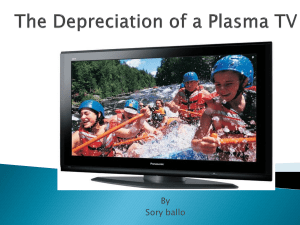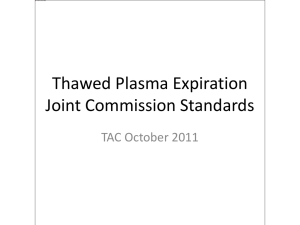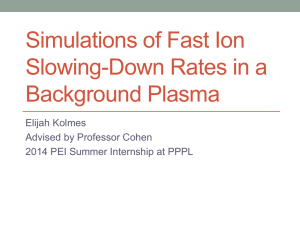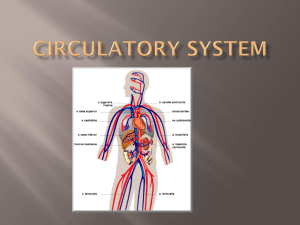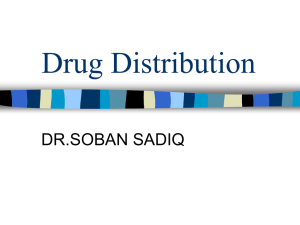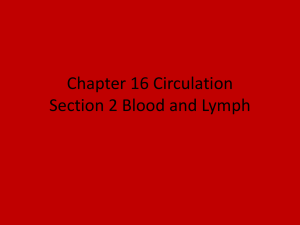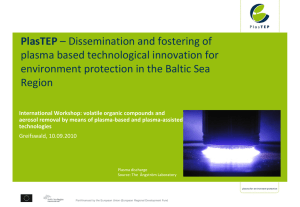Plasma technology for surface modification
advertisement
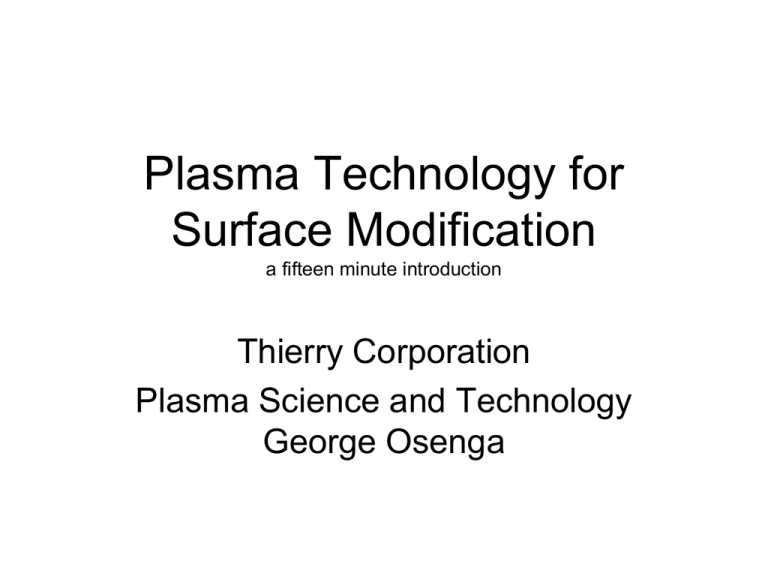
Plasma Technology for Surface Modification a fifteen minute introduction Thierry Corporation Plasma Science and Technology George Osenga Topics of Discussion • • • • • Plasma definition, an introduction Surfaces, an introduction Plasma surface, modification defined Plasma applications for manufacturing Conclusions Plasma Definition Introduction • Plasma is a (partially) ionized gas in which ions, electrons, and photons are present as well as radicals and molecules in an excited state Plasma Definition Introduction • Plasma is a (partially) ionized gas in which ions, electrons, and photons are present as well as radicals and molecules in an excited state • GASES GONE WILD Plasma Definition Introduction • Currently in industry we use two types of plasma. – Plasma generated in a vacuum or low pressure plasma – Plasma generated at near atmospheric pressure Plasma Definition Introduction • Plasma is also defined by the gas or gases used to make up the plasma • Common gases used in generating plasma in manufacturing today are: oxygen, argon, nitrogen, hydrogen, sulfur hexafluoride and many more Plasma Definition Introduction • Cold plasma discharges are generated by passing enough electrical current through a gas to cause the gas to change state • This electrical current often defines the process to generate the type of plasma: radio frequency, microwave, inductively coupled, and pulsed direct current Introduction to Surfaces • Surfaces commonly found in manufacturing that are plasma treated are defined by their composition • Examples of common materials: metals, plastics, rubber, elastomers, polymers, glass, ceramics, powders and liquids Introduction to Surfaces • There are virtually no size or shape limitations when it comes to plasma processing • Plasma systems are built to process something as small as a contact lens or as large as an aircraft wing • Plasma conforms to the shape of the articles or items it surrounds Introduction to Surfaces • Surfaces can also be treated when moving • Surfaces are treated during in-line process • Surfaces are treated when tumbled • Surfaces are treated in roll to roll • Surfaces like powders or liquids Plasma Applications for Manufacturing • Plasma Clean • Plasma Activate • Plasma Etch • Plasma Deposition/Coating Plasma Applications for Manufacturing Plasma Clean Inorganic Compounds - oils, mold release, polymer bleed, drill smear, fingerprints, solder flux, carbon ash Inorganic - metal oxides, metal oxide reduction Decontamination - extracellular debris, pyrogens, proteins, DNA, RNA Plasma Applications for Manufacturing Plasma Activate • Surface Activation – THE MOST COMMON (raise the surface energy) • Surface Passivation Plasma Applications for Manufacturing Plasma Etch • Chemical Etch • Physical Etch Plasma Applications for Manufacturing Plasma Deposition/Coating Hydrophobic (does not like water) - Fabrics, Footwear, Electronics, Medical Devices Hydrophilic (likes water) - Fabrics, Contact Lenses, Medical Devices Oleophobic (does not like oil) - Electronics, Optics, Marine Products Conclusions • Plasma processing in manufacturing is: safe, clean, and cost effective • Plasma equipment and technical experts are available • Plasma processing increases: quality, productivity, and profit Topics Discussed • Plasma definition, an introduction • Surfaces, an introduction • Plasma surface, modification defined • Plasma applications for manufacturing • Conclusions Thierry Corporation Plasma Science and Technology George Osenga Director of Operations North America, Mexico & Canada george.osenga@thierry-corp.com Phone: (248)-549-4581
